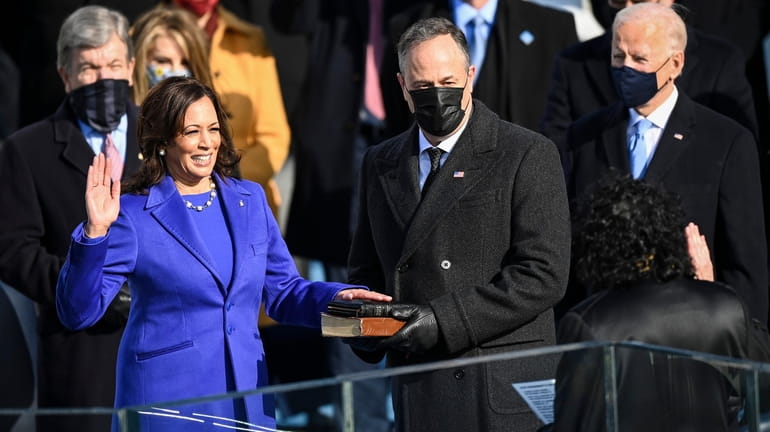American democracy finally passes the Bechdel test

Vice President Kamala Harris stands with husband Doug Emhoff as she takes the oath of office on Wednesday. Harris's swearing in was a Bechdel test of American democracy. Credit: The Washington Post/Jonathan Newton
The promise of a Joe Biden presidency was a return to normalcy, but 62 seconds of Wednesday's inauguration ceremony were quietly revolutionary. Not the soar of Amanda Gorman's poem, or the thunderous power of Lady Gaga using a golden microphone to belt the national anthem. In a ceremony filled with artistic creations specifically designed to arouse emotions of patriotism and pride, the 62 seconds that did so most effectively were from a bland, scripted oath of office, administered with the same exchange of words for more than a hundred years. But never between two women.
"Please raise your right hand and repeat after me," Justice Sonia Sotomayor instructed soon-to-be Vice President Kamala Harris. And Harris did.
On one side of the dais, the first Latina member of the U.S. Supreme Court had been entrusted to embody America's judicial system. She alone would be empowered to administer this oath.
On the other side, the first female, first Black and first Asian American vice president would be entrusted to swear it.
Harris vowed to support and defend the Constitution of the United States against all enemies, foreign and domestic. She vowed that she took the obligation freely, and that she would do her duty faithfully.
Do you know how rare it is to see women, and especially women of color, portrayed as patriots? As the strong forces who will be in charge of defending the country from enemies?
Two women, who wouldn't have been allowed to vote when this oath was written, whose Constitution — the one Harris vowed to Sotomayor that she would protect — doesn't even include the pronoun "she"?
Do you know how meaningful it was to see Harris's husband, Doug Emhoff, holding the Bible on which she placed her left hand — a silent act of support, a strong man graciously upholding his background role in helping his wife begin her job?
For Harris to be sworn in by any member of the court would have already been unprecedented. For Harris to be sworn in by another woman was breathtaking. It conveyed the message that women's words can be trusted. That the highest level of government business can be competently conducted with no men in the room. That when women speak to each other, it is right and appropriate that the dialogue be lofty, serious and important. That two women can look each other steadily in the eyes, and in the space between them they can hold the entire history and meaning of the republic.
Several years ago, a term arose in cinema and literature: The Bechdel test, named after cartoonist Alison Bechdel, judged artistic works based on whether there were any scenes in which two or more women had a conversation about something other than a man. Vice President Harris's swearing in was a Bechdel test of American democracy, and after nearly 250 years, we finally passed it.
I cannot stop watching these 62 seconds. Breaking them down moment by moment, each time finding something new. In the seventh second, the way Harris exhales before speaking, appearing to calm her nerves. In the 10th, the way Sotomayor incorrectly pronounces "Kamala," and Harris smiles because the flub is not going to throw her off today, and because she also knows that, for once, it was probably an honest mistake. In the 22nd, the way you notice that every person behind Sotomayor in the frame, every single one, is a man. Approaching the minute mark, how Harris mistakenly says "upon" instead of "on," and then raises an eyebrow as if to acknowledge her error.
And then, at the very end: "So help me God," delivered with a hint of actual supplication and vulnerability in the face of an enormous task, delivered with humility and joy.
So help me, that moment caught me out. You watch enough of these inaugurations and you think there's nothing left to impress you in the pomp and the circumstance. But then two women can take the dais and you suddenly hear the government of the people, all of its words and all of the things left unsaid.
Monica Hesse wrote this piece for The Washington Post.
